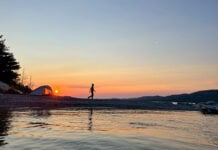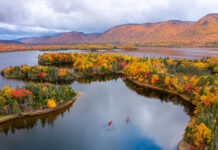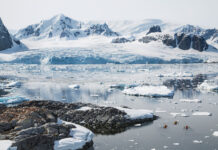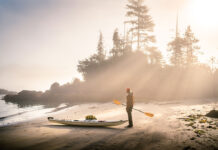I’m sitting under a tarp in the pouring rain, just smiling. I’m lit up with a pure spontaneous happiness I can’t really explain. Except I’m ecstatic to be right here, under my tarp that’s capably keeping the rain off my head, looking out at the water drops dancing on the lake, feeling more alive than I do 90 percent of the time back home.
My wife is just scowling. “I don’t like camping in rain,” she says. “I would rather be at home, warm and dry.”
How To Stay Happy In Bad Weather
She wants to know how, exactly, I can be so happy. It would seem there is something fundamentally different about me, or some magic Kool-Aid I drank. And it’s ironic, too, because at home I can be a miserable cuss for no reason at all. But when things get really nasty outdoors, the wind ripping the whitecaps off the wave tops, I light up like the proverbial pig in you-know-what.
I had originally intended to argue here my pet theory that enduring bad weather days is like a kind of investment. You put in your time, and maybe there is some kind of cosmic scorecard paying off in spectacular rainbows. Or in winter, as I like to muse to my companions on miserable chairlift rides, if we put in our time skiing mashed potatoes or ballistic windblown crust—because we are stupid or stubborn or committed enough to be out in this crap—the universe will have our backs.
It’s a kind of stubborn optimism, and not a bad life philosophy. An argument can indeed be made about the natural world rewarding those who put up with its ugly side. However, arguing that it’s purely a numbers game doesn’t do justice to the deeper truth going on.
It’s not so much about the weather outside, as what’s inside.
Attitude.
Discomfort changes your mindset. First, it contradicts your expectations of how the experience is supposed to be. The calm waters and blue skies of your imagination. There’s usually a period of disgruntlement, but that is followed by an acceptance of the way things are.
Bit by bit you’re forced to exit your head and confront the actual reality of the present moment and what it is asking of you—usually some form of engagement or response. This puts you in a state of receptivity. And also gives you the bizarrely empowering realization that in an environment that is totally out of your control, you are still in control of your own mind, which is its own kind of awakening.
Next thing you know you are fully there. Fully present.
This phenomenon of tuning in to the now has been described by countless mystics, philosophers and psychologists as openness, receptiveness, letting go, or what the philosopher Heidegger called turn to the senses Thoreau and the other so-called nature writers—who are really explorers of the mind—are always going on about.
It’s a universal prerequisite to peak experience, self-actualization and, if you’re so inclined, encounters with God. In this attitude, to quote nature writer Annie Dillard, “you catch grace as a man fills his cup under a waterfall.”
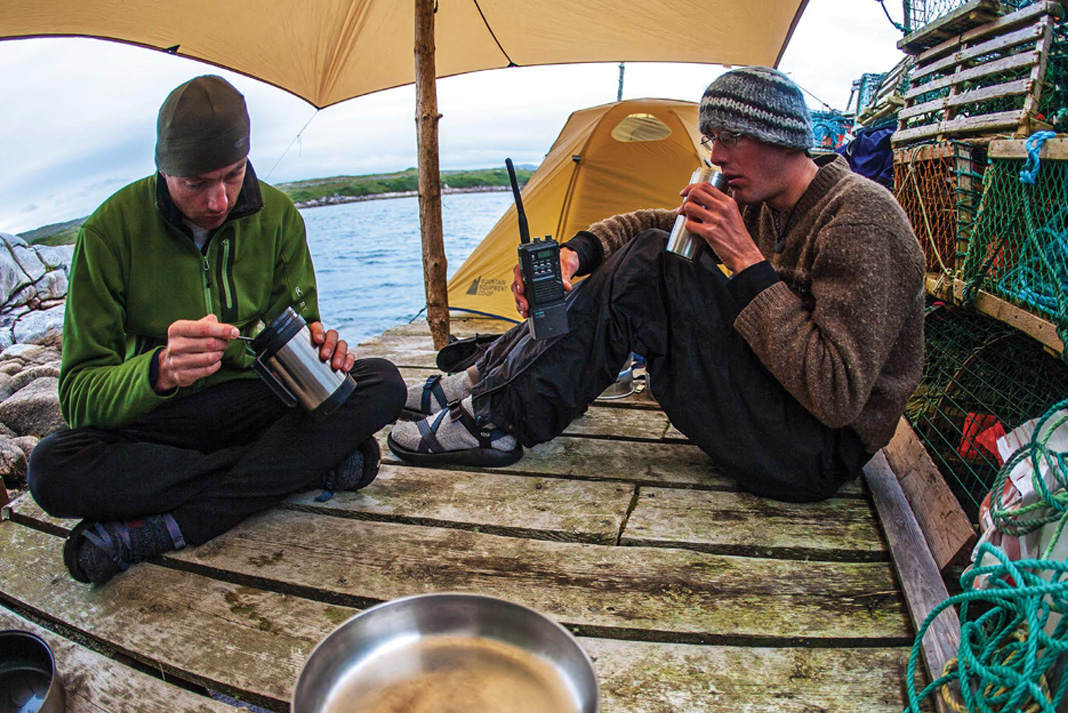
How The Good Comes With The Bad And Ugly
In this way, enduring hardship—bad weather or other forms of suffering—actually creates good experiences. It’s the mechanism by which some of the most powerful moments of my life were seared into memory.
The backpacking trip I did at summer camp as a frail kid who nearly fainted from exertion, but then proudly earned an award plaque still hanging in my dining room: “Ten miles in full pack, not one complaint!”
The winter sea kayaking trip to the Broken Group Islands where it rained and blew every day and nearly soaked us in our sleep, but for the final morning when we paddled under brilliant sun in a gently rolling five-meter swell.
A gorgeous sunset rock climb in Yosemite Valley where I wound up sick with fear because the only thing separating me from a long, messy fall were a few hairline fissures in a glacier-polished slab as smooth as a kitchen countertop, but I topped out feeling more alive than ever.
And that day on our recent family trip, sitting in the rain under the tarp, trying to explain why it made me happy. After 45 years on this beautiful planet, I could go on and on.
It’s these razor-edged experiences more than the brochure-worthy paradisiacal ones that keep me hooked. It’s what I want my kids to experience when the going gets tough. I want them to see their dear old dad isn’t some sadomasochist who likes to jump into cold water every morning and walk about with a loopy grin on his face when it pours because he perversely enjoys suffering. I want them to see the deeper truth that through life’s challenges is the path to true joy. And carry into their everyday lives this ethos, that, as the Barry Lopez writes in Arctic Dreams, “… a tolerance for the unconverted things of the earth is intertwined with the substance of a truly rich life.”
This is the problem I have with the so-called glamping trend of recent years. It entirely misses the point of camping as an attitude of approaching the world as given, rather than trying to mold the world to fit your idea of luxury. Which is the very core of what makes camping enjoyable. It’s what separates the so-called outdoorsy people from everyone else, with their stories about how they went camping once and hated it, because it was brutally uncomfortable, and so why suffer when you can just stay at home and sleep in a comfy bed?
I probably shouldn’t sound so self-righteous. I know sometimes miserable weather is just that. I’ve bailed on trips early to drive home in a warm car and loved it. But I think the argument still applies.
A warm car never felt so good, and I was never so happy to be home.
I still need constant reminders about this basic wilderness lesson. My paddle racing coach has even coined a hashtag for it: #lovetheconditions.
We need such reminders not only for outdoor pursuits but for life in general, because it can be hard to accept what you’re given. Sometimes the conditions do suck. And in those moments you forget it’s possible to love anything. You remember past wilderness experiences as wonderful. You go out expecting to find ecstasy and are instead surprised to find discomfort, and then endure discomfort to be surprised all over again by ecstasy. Life is a roller coaster and I’m always amazed by my need to learn its lessons over and over again.
Camping in the rain isn’t just some bizarre personal preference—it’s philosophy. Often we have to weather storms. The point is not that things will be easy, but to become better at adapting, to persist, as a matter of faith and principle. The outdoors teaches us that for whatever you can endure, you will be rewarded.
Tim Shuff is a writer and firefighter whose long-suffering wife finds his romantic idealism tiresome, and who, at this moment, is sipping coffee in his cozy house in Toronto wondering if it’s too cold and rainy to go paddling.





